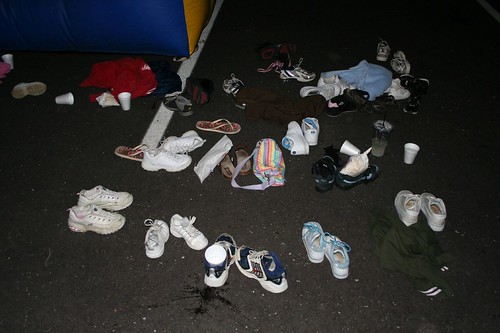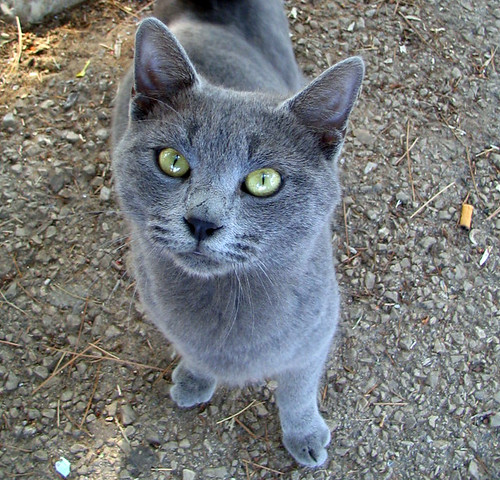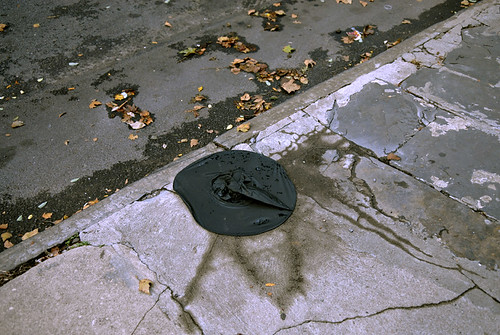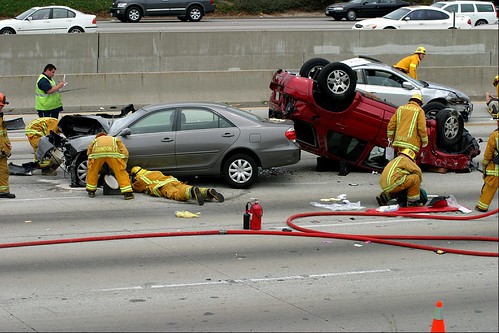
Today it snowed. A lot.
Although it's generally something we come to expect in Maine, this winter has proved more fruitful snow-wise than those of the past few years. Today was one of those days where those Mainers who actually did make it in to work (myself included) sat around doing nothing, wondering why in the hell they even came in. It was one of those days where, after several hours, bosses and managers state-wide looked out the window and thought,
Geez, this is
bad. Maybe I should let my employees go home. It was one of those days where you then were allowed to go home, and you got to drive in the most life-threateningly exciting part of the storm.
For some reason, those of us in the Legislative branch were the last to be granted passage home by the state bigwigs, despite having probably the least-pressing need to carry out our jobs on this particular day than most of the other fine folks employed by the state. But hey, I'll accept my decent wage to sit on my ass and play Crazy 8's.
All the snow this year has got me to thinking about snow. This seems obvious; specifically, my relationship to snow, and how I've battled with it since I've gained the insight (and free time) to be able to truly ponder such natural phenomena. From a purely logical perspective, snow is terrible. It hampers freedom of movement, costs time and money and physical manpower to remove, makes roads dangerous, gets all over your clothes and then makes them uncomfortable and soggy, and eventually partially melts, creating a slush/mud hybrid that offends all but the dirtiest and most careless of individuals. To a person bound firmly by logic, snow is nothing to be excited about. Snow makes life more difficult. In our fast-paced world of instant gratification, snow slows us down and makes our socks wet. So, whenever I discuss snow with someone, I invariably express these very sentiments: I say, "Damn do I hate snow."
But here's the kicker. Here's where stupid human psychology comes in.
Whenever I hear a forecast of snow, I get excited. Like, really excited. I'm interested in this snow. How much snow will there be? When is it coming? How long will it last? Snow is coming, and I'm eagerly anticipating its arrival. I go online. I check Weather.com. I look at the hour-by-hour breakdown, and I mentally file away times of day and percent chances of precipitation. When I encounter particularly uninteresting or relatively unfamiliar people, I interject my knowledge in the conversation. They say one of the most common conversation pieces is the weather, and I ride the cliche to town. "I hear we're going to get dumped on again," I say. "Oh no, really?" they ask, as if they didn't know, but because they're usually a Mainer, I'm pretty sure they've gone through all the same rituals as I have, and are fully aware of the impending ass-reaming-via-snow. Whenever snow is forecast, but will only amount to a few measly inches, I feel disappointed. I feel
cheated. When the estimates top a foot, my heartbeat hastens.
Bring on the snow, I think.
Bring it on, and bring it hard.
But why the schism between my internal desires and my external presentation? Why do I insist that I "hate" snow, yet never fail to become aroused (not like that) at the possibility of its coming (and not like
that)? I really don't mind trudging through snow. I don't mind cleaning the car off, I don't mind allowing a little extra time to arrive safely at my destination, I don't mind stomping my feet before entering buildings. I don't even mind shoveling. Why lead people to believe that I feel adversely about these things?
I don't really have a good answer for that. My conservative, logical, Apollonian side believes snow sucks, and perhaps this side has the quickest brain-path to vocal realization. My unbridled, emotional, Dionysian side is excited by the awesome power of nature manifested through mega snow dumpings, and so that's how I actually feel when the situation arises. It's not as though I consciously try to hide my glee at potential snow, or that I actively attempt to persuade people that I hate snow to make them accept me as a particular kind of person. I just realized: this is how things always play out.
And by relatively illogical Maine logic, there's actually a better show I could be putting on. It's the show of indifference. Two feet of snow topped with a three-inch crust of freezing rain? Yawn. It's Maine. No big deal. Can't see the vehicles in the driveway when you get up in the morning? Have to really put your shoulder into it to get the front door open? Pssh. Didn't someone say it was supposed to snow? I'm a Mainer. This is Maine. Snow. Maine. Yeah.
Granted, the "machismo implied through feigned indifference" ploy doesn't work on fellow Mainers, because (a) half of them pull the same crap and (b) the other half are busy actually dealing with the snow problem instead of pretending it doesn't affect their super bad-ass lives. This leaves very few individuals to present such an act to.
But really, it doesn't even work on non-Mainers. It only works briefly and unimpressively on people who have never seen snow before in their lives, and has about the same effect on those who've at least seen snow a handful of times. It's merely another one of those juvenile pieces of psychology that largely contributes to making someone a big fat tool: it's like stopping into the store after work with your tie and badge on, thinking everyone will wonder what sort of intriguing job you have and admire you for having this mystery profession, or sauntering through the mall with your collar popped, thinking you're drawing the eyes of all the hotties when in reality the only people who notice are the ones who think popping your collar is utterly idiotic. What you equate in your mind to being impressive and note-worthy (i.e., the way you shrug off a brutal snow-raping) other people don't even perceive, let alone ponder long enough to arrive at any sort of conclusion about what sort of person you are and how awesome that sort of person may or may not be. We all play these little mind games. Some people just play them in the snow.
And the point? You may be mistaken if you slogged through all this expecting to go home with one. I'm blogging. This is my first blog. This is the sorry stuff I thought about today.
But I'm going to try to improve with time. For now, I'll leave my blog with this message:
COMING SOON: PURPOSE!!!
 Today Ron Paul came to the State House. I didn't know anything about Ron Paul other than that he's a Republican that doesn't really act like one, and he wants to abolish the IRS. And I think I found a flyer of his in a public restroom the other week that ominously spoke of the imminent fusion of Mexico, the US, and Canada, and declared that we must stand against such horrendous horrors!
Today Ron Paul came to the State House. I didn't know anything about Ron Paul other than that he's a Republican that doesn't really act like one, and he wants to abolish the IRS. And I think I found a flyer of his in a public restroom the other week that ominously spoke of the imminent fusion of Mexico, the US, and Canada, and declared that we must stand against such horrendous horrors!

















